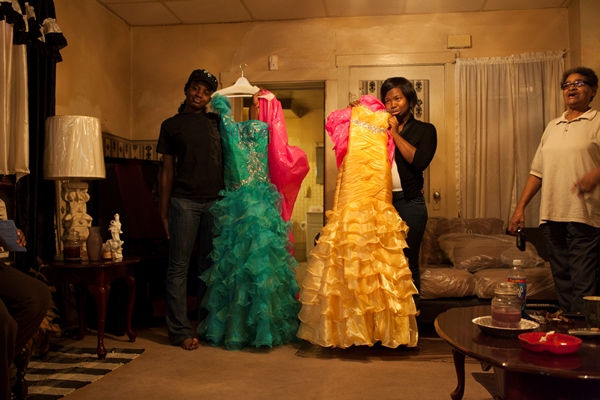
This year, films have a way of reminding us of everything we can’t do and of all the plans the pandemic ruined. In the case of Midnight in Paris, we think of the graduating high school seniors all over the country who could not go to prom. Prom, at the predominantly African American Flint Northern High School in Flint, Michigan, is not only the special, mythic night it is for teens across America but a privileged event that only those who successfully finish high school can attend. As such, attendance is an enormous source of pride. The documentary brings us back to 2012 to the week of that year’s celebration.
Flint is a city many of us are likely to know from the water crisis that began in 2014. It’s therefore fitting that, at the start, we hear high schoolers voicing frustrations with how their hometown is perceived. They complain that they “only get media when something bad happens.” This film offers a small corrective, taking graduation for the achievement that it is and emphasizing happiness, pride, and togetherness above all else.
Through unforced, casual, and compassionate interviews, we are introduced to a variety of teenagers, parents, and teachers, all of whom appear very comfortable in front of the camera. Some of the kids reveal their prom attire, discuss the processes by which they secured their date, their plans for the after-party and their goals in general.
The parents tend to talk about how proud they are of their children and highlight what they did to make sure that their kids would graduate. One father, as he gives his son a haircut, tells us extensively about how he taught his son to hunt with a bow and arrow, which taught him the discipline necessary to finish his high school years. We also hear a fair amount about what the kids are not allowed to do on the special night—sometimes very humorously—involving sex, drugs, and alcohol.
The first half is gentle, nuanced, unassuming, and sweet. Yet, when we come to prom and the after-party, the film loses steam and strength. On one hand, this is because not very much happens. The kids dance, then they go to rented motel rooms to drink and get stoned. The previously mentioned father arrives with his white girlfriend, and they spend a fair amount of time debating parenting. It’s possible that we are intended to observe the privilege she feels entering a Black space, because she does spend a fair amount of time telling others what to do and think, and it is unclear whether any of the kids actually want her there.
Midnight in Paris still manages to capture a sense of hopefulness and community that makes it worth seeing and consequently makes Flint’s water crisis even more tragic. Viewers will have ample space to empathize with its residents in this new film.
















Leave A Comment